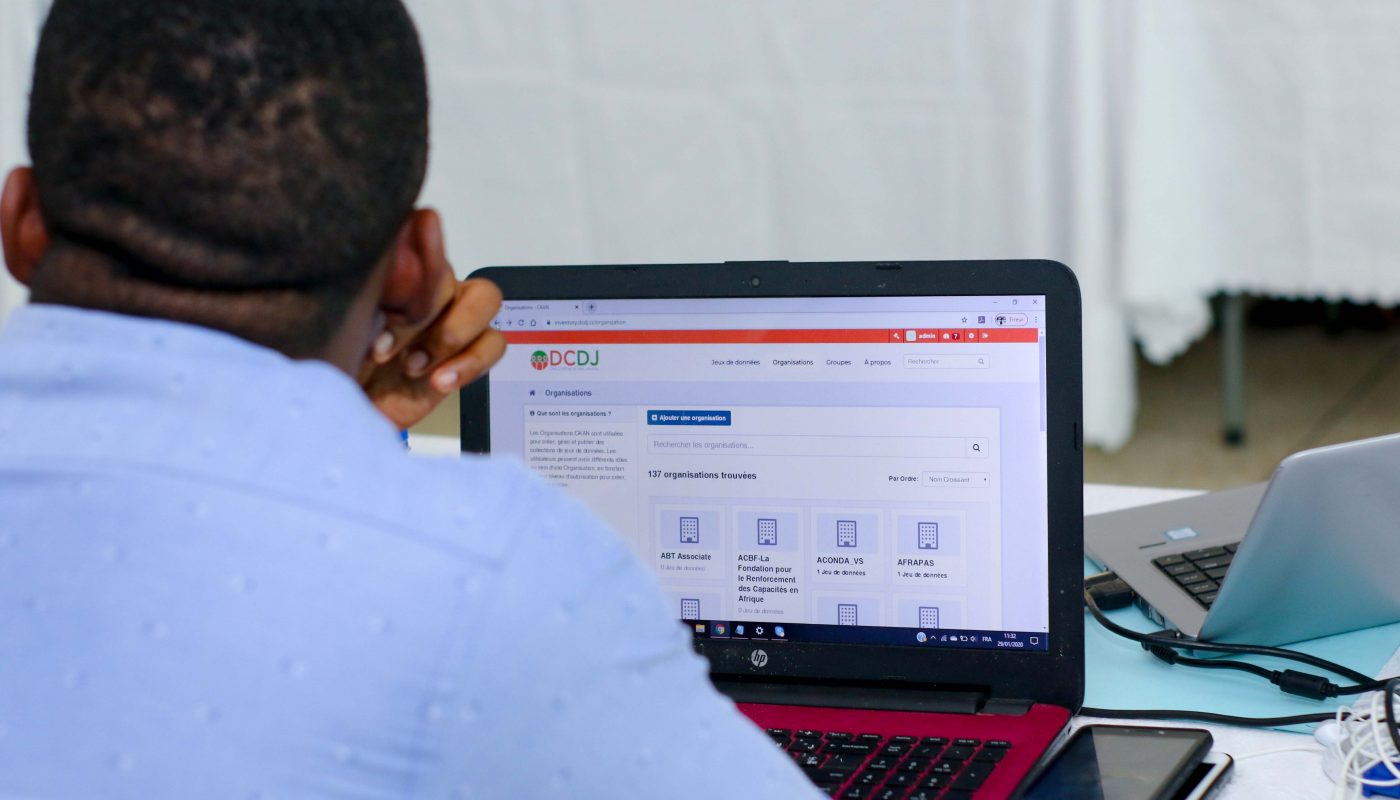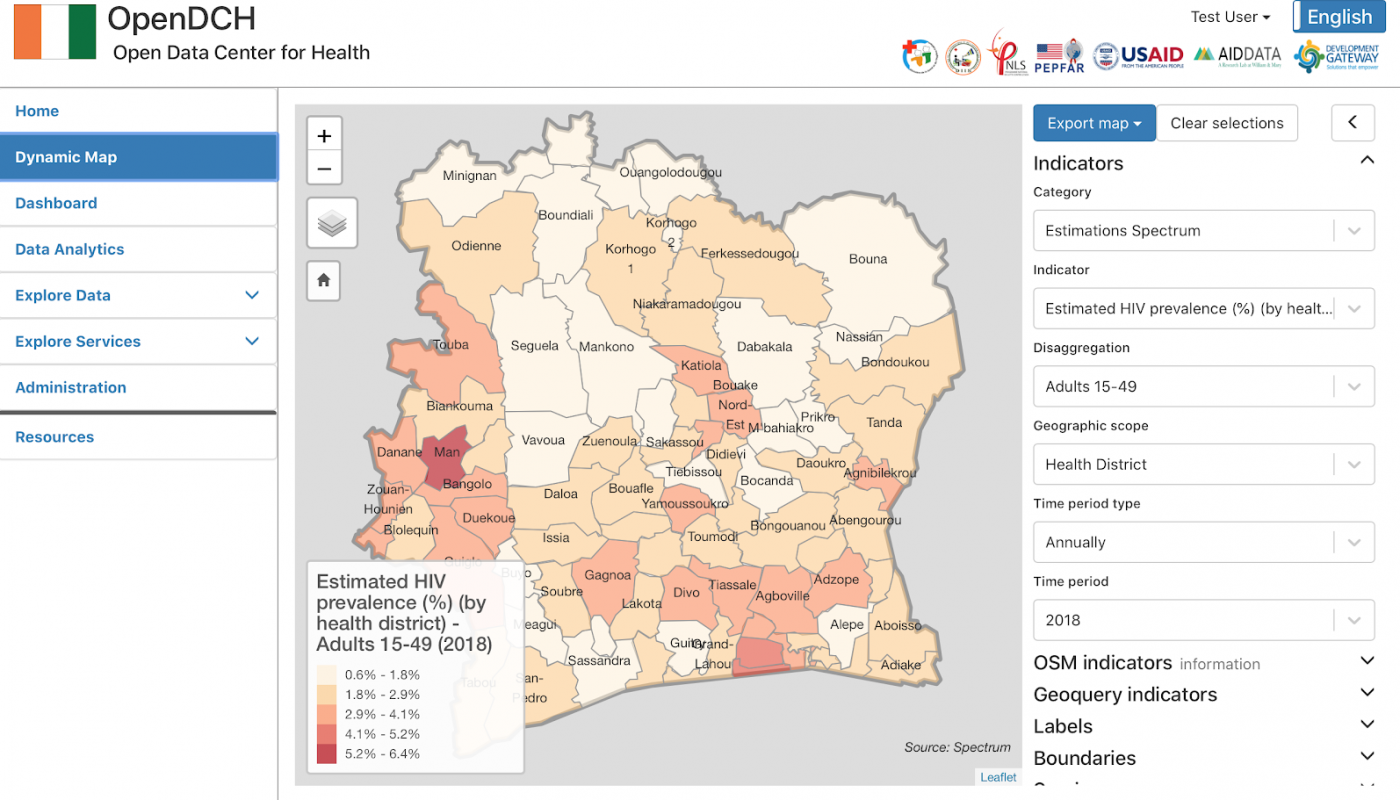Developing a Local Level Data Inventory
DCDJ and the Council of NGOs fighting AIDS and other pandemics in Côte d’Ivoire (COSCI) built a searchable list of hyper-local datasets across CIV. The data inventory holds records of which organizations have datasets related to topics of community interest, for example, which organizations have data on the number of individuals tested for HIV/AIDS in a specific year. Collating this information from disparate sources into one unified platform reduces duplication and siloed information. Through the data inventory, anyone – local officials, clinicians, community groups, researchers, etc. – can contribute to and access information on datasets in the community.
Des Chiffres et Des Jeunes (DCDJ) is a program led by Development Gateway and administered through the MCC-PEPFAR Data Collaboratives for Local Impact (DCLI) program. DCDJ aims to bolster the subnational supply and use of data for Ivorian citizens, engage youth as champions of these services, and fuel innovation to address rising data needs.
Background
A data inventory is a fully described record of the datasets maintained by/for an organization, region, thematic area, or government. Each inventory record contains basic information like data set name, purpose, owner, quality, and/or update frequency. This basic information about each data set is known as the “metadata.”1 A metadata inventory is beneficial in a context where information may be siloed across organizations, institutions, and departments, but where information could be useful when shared, or where valuable datasets are held by organizations working at the regional level.2
Problem
Across our work, we have found that data flows from the hyper-local levels in the form of reporting, but that local programs do not typically use that data themselves. Without local data, individuals often act as passive “beneficiaries.” There are strong arguments that local efforts and local governments are positioned to make the biggest impact on the SDGs. Despite this, there is still very little data actually accessible, shared, or reused locally. Government agencies and CSOs are unaware of what data sets exist, default to not sharing existing data, and duplicate efforts in data collection – or in some cases, fly blind without data needed to make informed decisions.
Working Toward a Solution
DCDJ worked with COSCI, a collaborative of 145+ community groups, to build, populate, and improving the data inventory. COSCI helped DCDJ understand what data already exists at the community level. This knowledge is essential to empowering local government, development partners, community organizations, and citizens to actually use that information.
We worked simultaneously on two workstreams: 1) awareness-raising and outreach, and 2) technical development. On the technical side, we initially worked with 17 stakeholders to understand the system requirements, develop, and test the beta product. To ensure sustainability, we built the inventory using CKAN, an open source platform, based in python. After the beta inventory was completed, we tested it with stakeholders and DCDJ data fellows.
For the awareness-raising and outreach component, we again partnered with COSCI to map organizations that would be interested in the inventory and that would have datasets to share. During the awareness-raising, we learned that individuals had difficulty envisioning why and how to use the originally empty platform. We used our network of DCDJ Data Fellows, who were already in placement sites, to identify existing datasets to populate the platform. This step made outreach much easier. In addition to one-on-one outreach and trainings, we also held larger training sessions where users learned the basics of data quality and use and technical aspects of using the platform. Additionally, we focused training on data governance and privacy. Issues of digital privacy were a new concern for many of the individuals and organizations involved in the data inventory. These sessions covered what qualifies as personal information, anonymization of data, how to strip a data set, and when to say no to data requests.
Outcomes and Next Steps
DCDJ’s Data Inventory was designed to make local data available to local CSOs. However, when it originally launched, only 2% of the 530 stakeholders (across 100+ organizations) had submitted datasets. According to Ms. Frida Seka, “the organizations felt like the inventory was a new problem we were adding to their shoulders.”
Through intensive awareness raising, data management training, and ongoing contact, the data inventory has grown exponentially since its inception and initial iteration. As of February 2021, stakeholders have supplied 614 total datasets with more added regularly. Each organization has submitted an average of five datasets, and we were able to increase dataset submission from 2% to 86% of targeted organizations in under a year. The Inventory acts as a bridge between organizations. People have easy access to new contacts and understand their roles in the larger data ecosystem more clearly.
Dongo Evariste, DCDJ Fellows Ambassador, explained, “CSOs are showing increased interest in the inventory, volunteering staff time to help the platform grow. CSOs also find the inventory useful, because it provides an easy map of the organizations working on a given topic, promotes sharing of information, and can trigger new partnership opportunities.” One business owner said that Data had always been useful to her, though she hadn’t always seen that information as “data” – it had long allowed her to connect with buyers and expand her business, but that the Inventory enabled her data to be useful to others as well. Of the data inventory training, Avi Eddy Bertand, Prevention Coordinator for Red Ribbon Côte d’Ivoire said, “Training allowed us to better understand how we could manage our data, how to collect it, how to use it. Before, we had difficulties being able to properly organize and secure our data. Now we have assigned someone to be responsible for the data and to share with partners when needed. We have also advised other NGOs to take part in the training and become members of the platform.”
As Mme. Seka put it, “it is a long and complex process to get entities to fully buy into the platform, but we are seeing more and more partners getting involved every day. Our work is not done, but the Inventory can help NGOs truly realize the importance of their work.”
1. GovExLabs, “Data Inventory Guide,” 2019, https://labs.centerforgov.org/data-governance/data-inventory/
2. Open Data Watch, “Assessing the Coverage and Openness of Official Statistics,” http://opendatawatch.com/publications/open-data-inventory
Share
Related Posts

The State of Data in Open Contracting
This past year has highlighted the global importance of public procurement. We witnessed the vulnerabilities involved as governments raced to procure PPE, ventilators, and other necessary resources at the beginning of the COVID-19 outbreak, and now procurement of vaccines. Stories of corruption and those taking advantage of the chaos have emerged, highlighting why open contracting data is more critical than ever. So where does open contracting (OC) data currently stand? Frankly, it still has quite a way to go, but the examples are promising.
What data exists?
Starting in 2019, DG worked with Transparency International to bring together procurement data from six different countries. We transformed the data for those countries that weren’t already into OCDS format and visualized the data on a series of charts based on our OC M&E and Corruption Risk Dashboard charts. What we learned as we began this process, was that all six countries were publishing very little data in common. In fact, the only data consistently published by all six countries was if the tenders were open/competitive, direct, selective, or limited procurement, which helps show how competitive their procurement processes are. A majority of the countries also published the name of the supplier that won the contract. There is much more volatility regarding what other data points countries choose to publish. For example, some publish estimated tender prices, some publish the actual awarded amount, some publish both.
What data is still needed?
Knowing how long a tender is open for submission can be helpful as short tender periods can indicate collusion; however, this requires data on not just the tender close date, but tender start date – when it first became open. It is less common to publish this date.
Information on specific item costs are much less likely to be published (though some still are!) Through the almost twenty open contracting assessments that we have conducted, we have heard that government entities struggle to know what a reasonable price is for certain items and projects. Price lists are often outdated, and estimates often turn out wrong. In one case, a government consulted local companies for prices. When the bids they received were far lower than what they originally heard, they canceled the tender from concern over the disparities in the estimates. Publishing data on the final contract or award costs for specific items would help other departments have a better idea of what an expected budget might be. To do this, governments must publish the specific items, unit, and item cost for their contracts. This necessitates having a single list of items and units that is shared. From our experience we have learned that while item lists might be relatively common, standard units might need to be put in place, as the unit makes a big impact on how much is actually spent per item. For example, in some cases “each” is used for most items rather than specifying the number of liters of petrol purchased or total km of road being built. Improved specificity ensures we are comparing the same cost per item. In Elgeyo County, Kenya, the government is interested in this data being used to alert officials if items are purchased for more than the recommended price. Data on items also allows other key analysis, such as if the government is procuring for the same items across departments, and if bulk purchasing could reduce costs. It could also help track:
- if the same company is supplying all resources for specific items
- if certain items are not procured through open procurement, but should be;
- if there are consistent challenges with implementation for certain items.
This data can be more tedious to report. Even if it is already created as part of a contract, it is typically not available in machine readable form. Reporting this data in machine-readable formats from the start can reduce the effort to publish them.
Implementation data is another data point that is often asked for by government, civil society, media, and other stakeholders; however, it is much more rarely published. Implementation data can include if a project was completed, if it was completed on-time or delayed, and if certain suppliers consistently fail to deliver or are behind schedule – which can help get delayed projects back on track. In Makueni County, Kenya, for example, we saw a local organization URAIA use the data to identify 34 delayed projects. They then shared this information with the county government, which prompted officials to investigate and address some of the problematic projects. Implementation data can also be a resource for government procurement teams to know if certain suppliers are less reliable. We hope to increase use cases like these through the addition of low-tech solutions. For example, DG developed an SMS feature for Makueni County that sends implementation updates to public subscribers and collects feedback.
Implementation data can be more difficult to publish as it typically requires getting information from different team members – such as Monitoring and Evaluations teams – rather than just from the procurement team. Solutions might need to be adapted to meet different team members’ needs. For example, we developed an offline, mobile data collection tool for Project Management Committee members to report to, since they were more dispersed throughout the county and had more connectivity issues. Meanwhile, government officers enter data at their office computers, with more consistent connectivity, making an online web portal more suitable. All teams should be engaged in publishing processes to see how to streamline procurement, and see how publishing additional data can benefit their needs as well.
In addition to the benefits outlined here, an overall benefit is a general trust that can be built through transparency. We have heard from many government agencies the challenges that come from citizens and companies questioning how procurement decisions are made, and the scandals that are unearthed by the media. When a story gets splashed in the media, the whole government can get dragged down, but with open procurement systems, like DG’s Open Contracting Portal, which includes the corruption risk dashboard, the government can identify and address corruption quickly. Overall, open contracting can strengthen trust by showing when processes are working correctly and being followed well.
General Challenges
While the OCDS standard has championed the need for common identifiers – IDs that are used to identify a specific organization or item – many countries still do not use common IDs. Standardized identifiers make it possible to ensure that the same organization, such as a supplier, buyer, or item, are consistently referenced across different tenders and contracts. These identifiers enable holistic analysis and often need to be created in order for open contracting to be implemented.
One of the most common challenges to publishing procurement data is the effort needed to put the data into a machine-readable format. Ideally, online systems would create streamlined processes where forms are entered and managed within the same system that publishes the data. Where possible, in Makueni County, online forms have started to replace manual forms. However, specific physical forms are often still legally required within procurement processes. Moving the creation of these forms to a solely digital format means a legal reform. As a result, some agencies take on the task of managing both a manual and online process; however, the benefits of making data transparent and the analytics and learnings several governments have been able to gain from this work has been worth it.
What is disheartening is when governments go through the effort to collect data, and in some cases may publish the data on web pages, but do not make the data available in any easily reusable format, such as Kenya’s PPIP and South Africa’s eTenderPublication. This means that agencies cannot easily access their data, and it is more challenging to analyze the data through charts and graphs. In particular, South Africa’s site is loosely structured since it is a simple HTML page that allows various data formats, spellings, and placement of the information, which makes the data especially difficult to reuse.
What’s Next?
We have been working to make our Open Contracting Portal, first launched in Makueni County, more flexible and customizable in order to scale to additional counties across Kenya, and hopefully to other countries as well. Additional counties and countries are starting to realize the benefits of open contracting — being able to use their own data for better decision making, building trust, and engaging more with communities they serve. We will continue to work with Makueni County and other government entities to create systems that can eventually replace manual processes, making open contracting the default, rather than the afterthought.
Photo by Joecalih via Unsplash

Increasing Data Quality at the Clinic to National Level in Côte d’Ivoire
Murielle Ettiene, a DCDJ Data Fellow was placed with the National AIDS Control Program, where she improved data quality through clinic-level trainings.
Background
The National AIDS Control Program (Plan National de la Lutte Contre le SIDA/VIH, PNLS) coordinates the national response to the HIV/AIDS crisis in Côte d’Ivoire. PNLS is responsible for collecting and reporting logistical and clinical data from 33 regions and 113 districts, as well as creating and executing the National Strategic Plan (Plan National du VIH/SIDA, PNS) to fight HIV/AIDS, which is the national roadmap for the next five years of Côte d’Ivoire’s epidemic response.
Des Chiffres et Des Jeunes (DCDJ) aims to bolster the subnational supply and usage of data for citizens of Côte d’Ivoire, engage youth as champions of these services, and fuel innovation to address rising data and information needs. Through the DCDJ Fellowship Program, Ivorians between 18 and 34 years old spend two months in intensive data science and analytics training. Following the training, Fellows are placed in internships to support their hosting organizations in making data-informed decisions. DCDJ (Des Chiffres et Des Jeunes) is a project of the Data Collaboratives for Local Impact (DCLI) program, a partnership between PEPFAR and the Millennium Challenge Corporation (MCC) that aims to increase expertise and resource availability in Côte d’Ivoire.
Before applying to become a DCDJ Data Fellow, Murielle Ettiene had earned a BA in Economics and Statistics and was preparing to start a Master’s Degree in Finance and Banking. She already had experience working in a financial institution, and hoped that the program would help her towards a career as a Financial Analyst. After being accepted into the program and completed her training, Murielle was placed at PNLS. She worked with both the Monitoring and Evaluation Unit and the Care and Treatment Department.
Problem
While working in both departments, Murielle saw data quality to be the biggest challenge, specifically in evaluating the systematic care of HIV/AIDS patients. She realized that the mistakes came from detail processing at the facility level where doctors, social workers, and other clinic staff record data. After investigating and visiting the clinics, Murielle understood that the real problem was a lack of training.
Solution
To support better data quality and more effective data use for decision-making, Murielle developed a training for staff in her department at PNLS, focused on using Excel and PowerPoint. After the initial training at PNLS, she set her sites on the deeper problem – poor quality data coming from the HIV/AIDS clinics and care sites. After completing the DCDJ Fellowship, she continued working with PNLS as a volunteer. It was at this point that Murielle started working directly with the clinics and care sites, providing similar training with a focus on data quality.
Outcomes and Impact
The data collected by each clinic is reported to PNLS, who uses it to inform budgets, programs, and long term planning. With Murielle’s help, 10 individuals were trained in computer literacy and data quality at PNLS. Additionally, she contributed to the evaluation of the quality of services in 13 health centers for the management of HIV/AIDS, and to the Data Quality Assessment and subsequent training at 12 sites at the national and sub-national levels.
Ultimately, the training resulted in a higher quality of data coming from the clinics and a better quality control system at PNLS. Now, people who were not previously involved in data processing and data management – due to a previous lack of training – can contribute to the process. With data quality control managed closer to data reporting, identifying and cleaning errors takes less time, which means that processing at the national level is a smoother process.
Murielle was most focused on data related to systematic care. Systematic care data collected by PNLS is used to understand how and where interventions are working, and provides the evidence needed to update or change policies where interventions are not working.
Conclusion
Murielle was in a unique position as a Fellow at PNLS. Because her role was to evaluate and improve the data ecosystem, she had the flexibility to provide facility-level training. After seeing changes in data quality at the facility level, Murielle said, “If the data at the bottom of the ladder is broken, it will impact the results at the top” adding the insight about her work, “through each line of data, you see the lives of the people you are impacting.”
Also, because women in data science are somewhat rare in Cote d’Ivoire, Murielle had not originally considered a career in this field. The Fellowship opened her eyes to that potential, especially a career in monitoring & evaluation.
Share
Related Posts
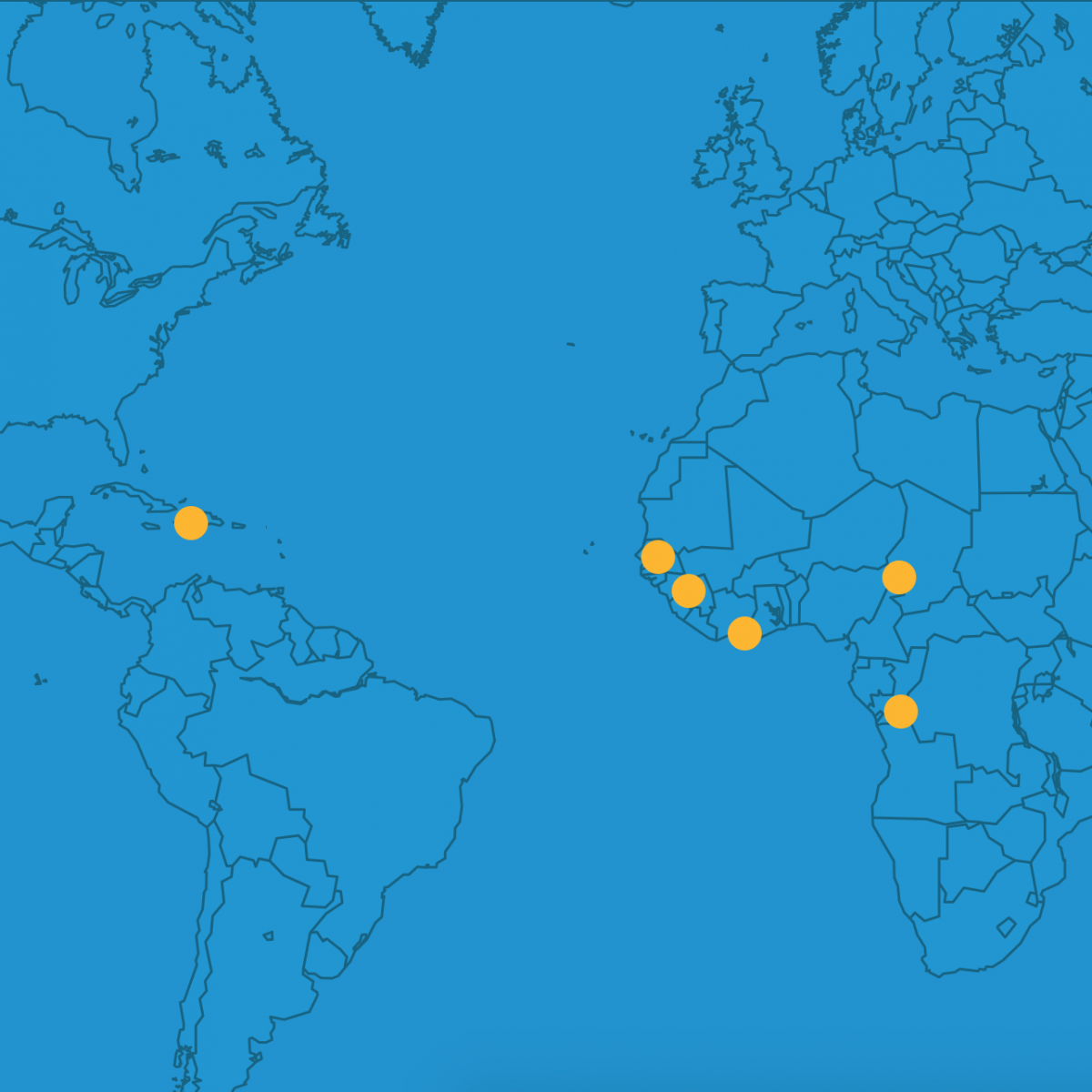
Du côté de l’Afrique Francophone et des Caraïbes
DG met en œuvre des projets dans les pays francophones d’Afrique et des Caraïbes depuis 2007. Nous mettons notre expertise technique au profit de nos partenaires à travers des outils capables de soutenir les processus et de permettre des analyses personnalisées pour de meilleurs résultats dans plusieurs secteurs, notamment l’assistance au développement, l’agriculture, les industries extractives et la santé. Ce bulletin d’informations présente le travail récent ou en cours de DG dans les pays francophones.
Assistance au développement
AMP République Démoctactique du Congo (RDC)
Dans le cadre de la redynamisation du processus PGA en RDC, nous avons mis à jour et déployé la nouvelle version du logiciel de la plateforme de gestion de l’aide (PGAI 3.4.1.). D’autres fonctionnalités ont été activées pour améliorer la qualité des données PGA, y compris :
- La fiche d’évaluation des partenaires – un module qui évalue la réactivité des partenaires à fournir leurs données en réponse aux requêtes du Gouvernement;
- Le gestionnaire de couches SIG – une fonctionnalité qui permet d’ajouter les informations sous forme de couches superposées sur la carte pour des analyses fines;
- D’autres fonctions pour contribuer à faire de la PGAI un outil susceptible d’éclairer la prise de décision en RDC.
Cette mise à jour s’est étendue à l’outil IATI et au portail public, qui publie les informations sur les projets et programmes de développement. L’outil IATI de nos PGA peut être utilisé pour extraire les informations sur les activités de développement à partir du registre prévu à cet effet, disponible en ligne. Les informations utiles incluent le montant des engagements et des décaissements, les agences d’exécution, les secteurs d’intervention etc. Nous avons également activé le module PGA Hors-Ligne pour pallier les défis en matière de connectivité Internet auxquels sont confrontés nos partenaires en RDC. L’équipe technique de DG travaille en parallèle sur un tableau de bord personnalisé qui permettra de suivre les progrès vers les indicateurs du New Deal (NDD) et la nouvelle stratégie de développement national (PNSD) de 2019, ainsi que les Objectifs de Développement Durable (ODD). Le nouveau tableau de bord sera intégré au site web du ministère du plan.
PGA Tchad
Le Tchad a été le second pays en Afrique Francophone à vouloir redynamiser leur processus PGA après trois années d’inactivité, même si la Direction de la Planification a continué à recueillir certaines données des projets de développement dans un classeur Excel. Le travail de l’équipe de DG a commencé par un nettoyage préliminaire de la base de données qui a permis d’archiver plus de 200 projets clôturés. DG a également actualisé les programmes PGA avant d’entamer les travaux techniques préliminaires, notamment ceux liés à leur base de données par rapport à la dernière version disponible du logiciel PGA (3.x). La nouvelle version de la PGA a été installée en novembre 2020 et des formations sur l’outil sont prévues dans le cadre du volet de renforcement de capacités du programme PGA. Sur la base des enseignements tirés de la mise en œuvre initiale de la PGA, le ministre de l’économie et de la planification du développement a invité les donateurs et les autres parties prenantes à contribuer à la plateforme pour en faire la référence pour toutes les informations relatives à l’assistance au développement. Ce leadership politique fort constitue une incitation à maintenir et à utiliser la plateforme sur le long terme.
Tableau de bord de la coopération Sud-Sud (CSD) en Haïti
DG a établi un partenariat avec le Centre de Données sur la Politique de Développement et l’USAID, par le biais du Higher Education Solutions Network (HESN), pour aider Haïti à mieux tirer parti des avantages de sa plateforme de gestion de l’aide (MGAE). L’objectif est d’accroître l’utilisation des données par les ministères et les partenaires au développement en incorporant la gestion de la coopération Sud-Sud. En effet, l’aide au développement traditionnelle tend à se concentrer sur le financement et les chiffres, tandis que la coopération Sud-Sud est plus souvent sous forme de soutien en nature, y compris l’assistance technique, qui peut être difficile à quantifier. DG développe actuellement un tableau de bord de la Coopération Sud Sud (CSS) intégré au MGAE pour mettre en évidence et visualiser les formes d’assistance technique des partenaires du Sud (ALC, Afrique et Asie) qui contribuent au développement d’Haïti.
Agriculture
Le programme de décisions administratives fondées sur des données (AD3) au Sénégal
Le programme AD3 travaille avec le gouvernement et la société civile pour co-créer de nouvelles stratégies visant à maximiser l’utilisation des données administratives. Financé par la Fondation William & Flora Hewlett, AD3 vise à répondre aux principaux défis de l’utilisation efficace des données administratives dans le secteur de l’agriculture.
Le programme comporte deux volets spécifiques :
La Plateforme AGRIDATA : Exploiter le pouvoir des statistiques agricoles
DG s’est associé à l’Initiative Prospective Agricole et Rurale (IPAR) dans le cadre de son programme avec l’Agence Nationale de la Statistique et de la Démographie (ANSD) visant à exploiter le pouvoir des statistiques agricoles pour promouvoir des stratégies axées sur le développement durable du secteur agricole. La plateforme analytique intègre des ensembles de données de haute qualité sur la chaîne de valeur agricole (production, consommation, marché), des indicateurs de développement internationaux et nationaux et des microdonnées.
Le Portail pour le suivi de la campagne agricole au Sénégal
DG collabore avec le groupe de travail Pluridisciplinaire (GTP), un forum coordonné par l’Autorité Nationale de l’Aviation Civile et de la Météorologie (ANACIM) qui vise à informer et à guider le développement de systèmes d’alerte précoce pour la sécurité alimentaire au Sénégal. DG développera un tableau de bord qui donnera accès à un ensemble de visuels et de ressources pour faciliter l’utilisation des informations sur l’agriculture, la météorologie, les besoins en eau des cultures, l’hydrologie, la situation phytosanitaire, le pastoralisme et la végétation. Le tableau de bord sera officiellement lancé durant le premier trimestre 2021.
Industries extractives
Indice pilote des femmes dans l’industrie minière (WIM) en Guinée
DG, en partenariat avec WIM Guinée, et avec le soutien d’OSIWA Guinée, a conçu l’index pilote WIM Guinée, un outil de visualisation en ligne, basé sur des indicateurs et des variables nationaux, notamment le rôle du gouvernement dans la promotion de l’égalité des sexes, l’implication des compagnies minières, le rôle des OSC dans la défense des intérêts, l’autonomisation des femmes, l’impact des activités extractives sur la santé des communautés, en particulier des femmes. L’indice pilote WIM Guinée a été conçu pour mesurer l’inclusion des femmes dans le secteur minier guinéen, aider à comprendre les obstacles rencontrés dans les environnements d’entreprise et les communautés, et mesurer l’exposition des femmes aux dangers des activités minières.
Santé
Projet de centre ouvert de données géospatiales (OpenDCH) en Côte d’Ivoire
Le Centre de Données pour la Politique de Développement et DG AidData se sont associés à l’USAID/Côte d’Ivoire pour construire un centre de données géospatiales ouvert/GeoCenter for Health comme centre de collaboration. Ce projet, axé sur le VIH/sida, visait à faire progresser l’analyse de la localisation des communautés touchées, en se concentrant sur les zones où les lacunes en matière de dépistage et de traitement du VIH sont les plus importantes. En plus de l’outil développé, le projet a équipé le niveau national et 39 districts sanitaires de matériel informatique (41 écrans, 94 ordinateurs portables, 46 imprimantes, 86 GPS, 85 smartphones et 186 wifi pocket) et a également rénové et équipé une salle serveurs. Le projet OpenDCH s’est achevé en juillet 2020.
Des Chiffes et Des Jeunes (DCDJ) en Côte d’Ivoire
DCDJ est un programme dirigé par Development Gateway et financé par le programme MCC-PEPFAR Data Collaboratives for Local Impact (DCLI). Le programme vise à améliorer l’écosystème des données en Côte d’Ivoire, à augmenter l’offre et la demande de données – en particulier les données sur la santé – et à former et soutenir les utilisateurs de données. L’une des composantes du programme, les Data Fellows, a formé de jeunes Ivoiriens à la science des données et les a ensuite placés en stage au sein d’organisations pour soutenir leur lutte contre le VIH/SIDA. L’une des fellow, Murielle, a travaillé avec les départements de suivi et d’évaluation et de soins et de traitement du Plan national de la lutte contre le SIDA/VIH (PNLS) et a constaté des incohérences dans les données communiquées par les cliniques et les pharmacies. Dans le cadre de sa recherche, elle s’est rendue sur les sites de déclaration, et a vu que les travailleurs n’étaient pas correctement formés – et qu’ils communiquaient par conséquent des données erronées. Murielle a ensuite formé les travailleurs des sites au contrôle qualité et à l’élaboration de rapports. Elle a déclaré : “Si les données au bas de l’échelle sont fragmentées, cela aura un impact sur les résultats au sommet”.
Bonne lecture !
Rapport final : Évaluations du portail de données sur les industries extractives
DG a mené des évaluations, à partir de juin 2018, sur le paysage des données des industries extractives au Sénégal, au Nigeria et en Guinée afin de déterminer la faisabilité et la pertinence d’y installer des portail de données ouvertes sur les industries extractives (PDEI). Ces rapports détaillent les constats, les besoins exprimés des différents acteurs et les recommandations de DG pour des données plus ouvertes.
Rapport final : Indice pilote des femmes dans l’industrie minière en Guinée
Rapport final suite à l’évaluation de DG et à l’élaboration de l’index pilote de WIM-Guinée pour les femmes dans les mines. L’indice a été conçu pour comprendre les obstacles réels qui entravent l’implication et l’autonomisation des femmes dans le secteur minier en Guinée.
Partager
Les Points Forts
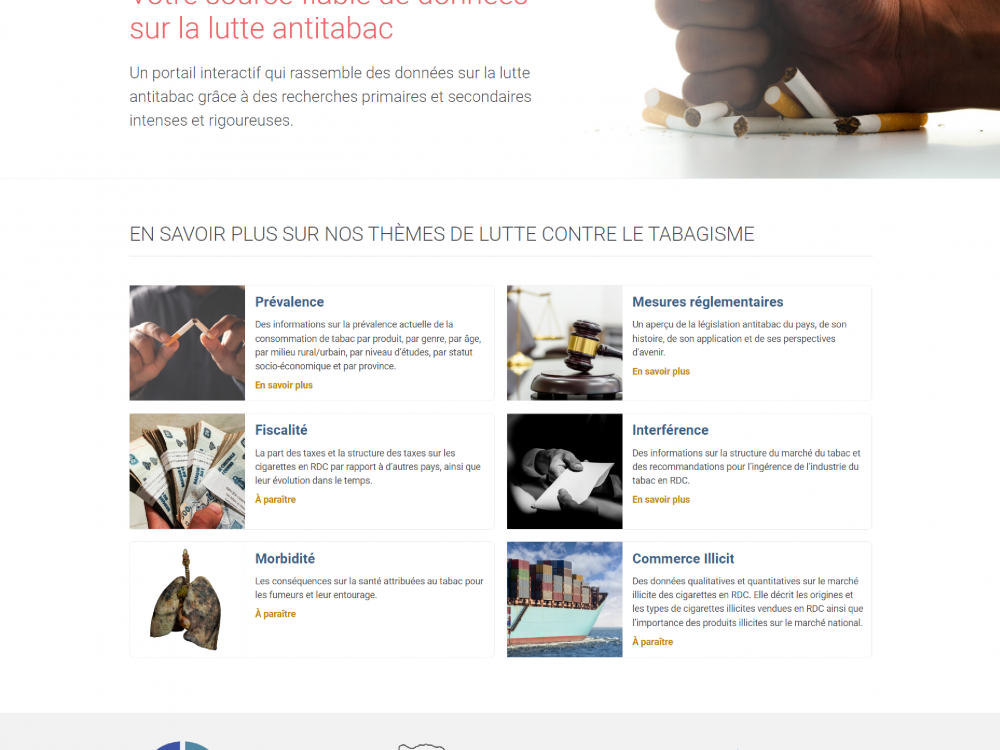
Faire progresser la lutte antitabac en République Démocratique du Congo : Site web de l’initiative de données sur la lutte antitabac (TCDI)
En partenariat avec le Ministère de la Santé de la République Démocratique du Congo (RDC), le Programme National de Lutte Contre la Toxicomanie et les Substances Toxiques (PNLCT), Development Gateway : An IREX Venture (DG) a lancé le tableau de bord de la Tobacco Control Data Initiative (TCDI) de la République Démocratique du Congo (RDC) à Kinshasa, RDC, le 29 mai 2023.
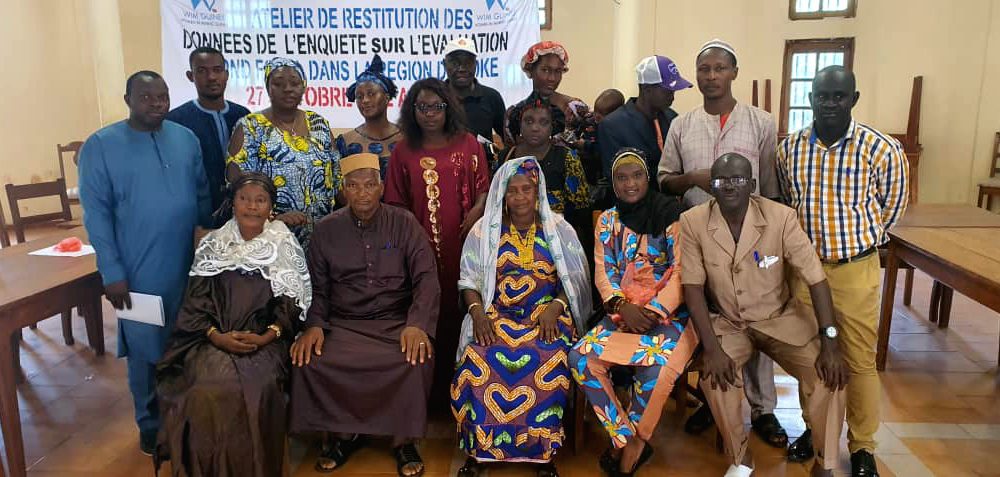
Les Fonds FODEL : Un appui aux femmes des es communautés minières avec WIM Guinée
Nous avons organisé un atelier de validation avec notre partenaire de mise en œuvre, Women in Mining (WIM) Guinea dans la région de Boké le 22 octobre 2022 pour confirmer les résultats d'une collecte de données conduite par WIM Guinée dans les sous-préfectures minières de Boké et Boffa. Les données ont révélé des améliorations potentielles des fonds de développement économique local (FODEL) et de leur administration qui, si elles sont mises en œuvre, pourraient permettre davantage aux femmes et aux associations de femmes des communautés minières de capitaliser sur ces fonds et de mieux les utiliser pour soutenir leur développement local.

Échos du secteur de la noix de cajou – André M. Tandjiekpon
André M. Tandjiekpon, Secrétaire exécutif du Conseil international consultatif du cajou (CICC), donne un aperçu du travail du CICC et explique comment la plateforme Cashew-IN développée par DG contribuera à son travail.

Highlights from Francophone Africa and the Caribbean
DG has been implementing projects in French-speaking African and Caribbean countries since 2007. We apply our technical expertise to develop multilingual customized tools, processes, and analyses to help our partners achieve results in various domains including development assistance, agriculture, extractive industries, and health. This newsletter highlights DG’s ongoing work in francophone countries.
Development Assistance
AMP Democratic Republic of Congo (DRC)
We successfully upgraded and deployed the new version of the Aid Management Platform (AMP) software (3.4.1.), which includes functionalities to significantly improve data quality such as:
- The Donor Score Card – a module aimed at evaluating donors timeliness in disclosing their development assistance data
- The GIS Layer Manager – a functionality that adds indicator information on the map
- Other functions for making AMP a powerful tool for decision-making purposes.
Additionally, we deployed the IATI tool and Public Portal, which will allow countries to publish their development assistance information. The IATI tool can be used to retrieve and download development projects directly from the registry including, commitment and disbursement amounts, executing agencies they work with, etc. We also activated the AMP Offline module as DRC has continuously been facing challenges with Internet connectivity. DG’s tech team is working in parallel on a customized dashboard that will monitor and track progress towards the New Deal Indicators (NDD) and the new 2019 National Development Strategy (PNSD) as well as the Sustainable Development Goals (SDG). The completed NDD/PNSD Dashboard will be integrated to the Ministry of Planning Website.
AMP Chad
Chad is the second country that expressed the need to revive their AMP process after three years of inactivity even if they have been collecting project data via an Excel workbook. The DG team started by cleaning up the current database, archiving more than 200 projects that have been completed. DG also added the new national strategy before starting the preliminary tech work on this project, namely, applying the new AMP software version (3.x) to their database. The updated version was deployed on the production server in November 2020. Several training sessions have been planned in the upcoming weeks as part of the capacity building effort of our AMP program. Working toward sustainability and building on our lessons learned from the initial AMP implementation, the Minister of Economy and Development Planning has invited donors and other stakeholders to contribute to the platform with the intention of making it the go-to source for all information related to development assistance. This strong political leadership provides an incentive to maintain and use the platform in the long term.
Haiti South-South Cooperation (SSC) Dashboard
DG partnered with the AidData Center for Development Policy and USAID, through the Higher Education Solutions Network (HESN), to support Haiti in building upon its existing Aid Management Platform (MGAE). The goal is to increase data use among government ministries and development partners. Traditional development assistance tends to focus on financing and figures, while South-South Cooperation is more often in-kind support, including technical assistance, which can be difficult to accurately capture in numbers. DG is currently developing an SSC dashboard within the MGAE to highlight and visualize forms of technical assistance from partners in the Global South (LAC, Africa, and Asia) who contribute to Haiti’s development.
Agriculture
The Administrative Data-Driven Decisions (AD3) Program in Senegal
The AD3 program is working with the government and CSO to co-create new strategies for maximizing the use of administrative data. Funded by the William & Flora Hewlett Foundation, AD3 aims to respond to key challenges to effective administrative data use in the Agriculture sector. The program has two specific components.
The AGRIDATA Platform: Unleashes the power of agricultural statistics, empowering stakeholders to monitor the agricultural season in Senegal. For this platform, DG is partnering with the Agricultural and Rural Perspective Initiative (Initiative Prospective Agricole et Rurale) in Senegal, with the National Agency of Statistics and Demography (Agence Nationale de la Statistique et de la Démographie). The analytical platform integrates high-quality datasets on the agricultural value chain (production, consumption, market) international and national development indicators and microdata.
Agricultural Season Monitoring Platform: DG is collaborating with the Multi-disciplinary Working Group (GTP), a forum coordinated by the National Civil Aviation and Meteorology Authority that aims to inform and guide the development of early warning systems for food security. The dashboard will give access to a set of visuals and resources to facilitate the use of information on agriculture, meteorology, crop water needs, hydrology, phytosanitary situation, pastoralism, and vegetation. The dashboard will be officially launched by the end of 2020.
Extractives Industry
Women In Mining (WIM) Guinea Pilot Index
DG, in partnership with WIM Guinea, and with the support of OSIWA Guinea, designed the WIM Guinea Pilot Index, an online visualization tool, based on national indicators and variables including, the role of the government in promoting gender equity, the involvement of mining companies, the role of CSOs in advocacy, women’s empowerment, the impact of extractive activities on the health of communities, especially women. The WIM Guinea Pilot Index was designed to measure women’s inclusion in the Guinean mining sector, help understand the barriers faced in corporate environments and communities, and measure women’s exposure to the dangers of mining activities.
Health
Open Geospatial Data Center Project (OpenDCH) in Côte d’Ivoire
The AidData Center for Development Policy and DG partnered with USAID/Cote d’Ivoire to build an open geospatial data center/GeoCenter for Health as a hub of collaboration. This project focused on HIV/Aids and aimed to advance analysis on where affected communities are located, focusing on areas with greater gaps for HIV testing and treatment. In addition to the tool developed the project equipped the national level and 39 health districts with IT equipment (41 screens, 94 laptops, 46 printers, 86 GPS, 85 smartphones, and 186 mobile internet units) and also renovated and equipped a server room. The OpenDCH project was completed in July 2020.
Des Chiffes et Des Jeunes (DCDJ) in Côte d’ivoire
Des Chiffres et Des Jeunes (DCDJ) is a program led by Development Gateway and funded by the MCC-PEPFAR Data Collaboratives for Local Impact (DCLI) Program. The program aims to improve the data ecosystem in Côte d’Ivoire, increase the supply and demand for data – particularly health data – and to train and support data users. One component of the program, the Data Fellows, trained young Ivorians in data science and then placed them in internships supporting organizations fighting HIV/AIDS. One of the fellows, Murielle, worked with both the M&E and the Care and Treatment Departments of the National AIDS Control Program (Plan National de la Lutte Contre le SIDA/VIH, PNLS). She saw inaccuracies in the data reported by clinics and pharmacies and visited the reporting sites, and learned that workers were not properly trained – and were reporting poor data as a result. Murielle then trained workers at the sites on quality control and reporting. She said, “If the data at the bottom of the ladder is broken, it will impact the results at the top.”
Happy Reading!
Final Report: Extractives Industry Data Portal Assessments
Starting in June 2018, DG assessed the extractive data landscape in Senegal, Nigeria, and Guinea to determine the feasibility of developing an Extractives Industry Data Portal (EIDP) for each country. These reports detail the findings, the actors expressed needs, and recommendations.
Read the EIDP Assessment Report →
Final Report: Women in Mining Guinea Pilot Index
The final report following DG’s assessment and pilot index for Women in Mining Guinea. The index was designed to capture the real obstacles hindering women’s involvement and empowerment in the mining sector.
Share
Related Posts
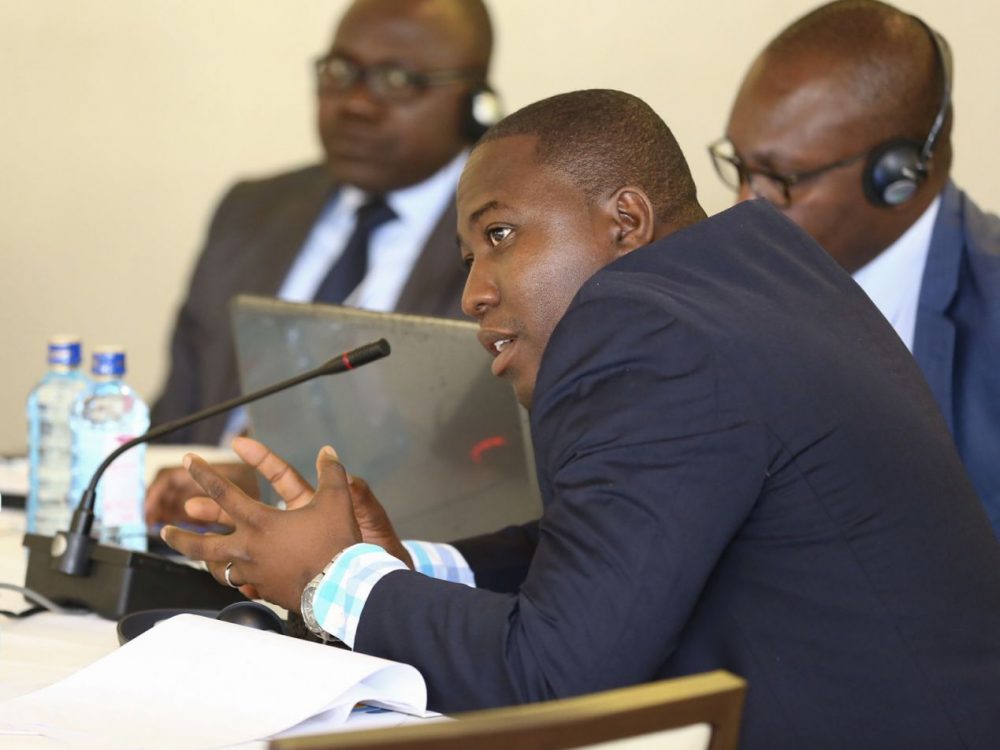
AMP Through the Ages
15 years ago, AMP development was led by and co-designed with multiple partner country governments and international organizations. From a single implementation, AMP grew into 25 implementations globally. Through this growth, DG has learned crucial lessons about building systems that support the use of data for decision-making.
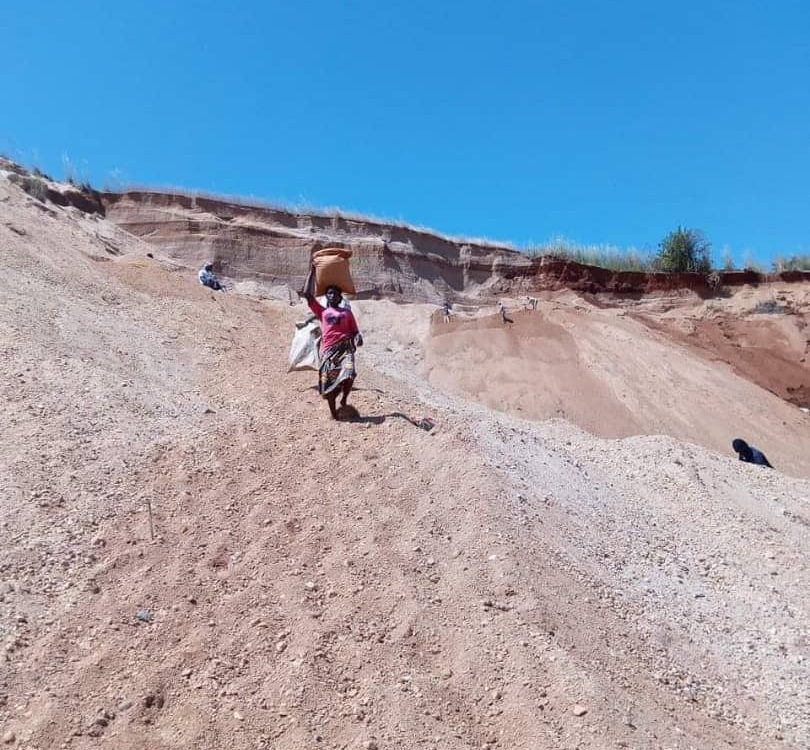
A Reflection on the State of Extractive Industry Data
In the past few years, DG has increased focus on the extractives industry (EI) in West Africa and learned tremendously about the data gaps and opportunities in this sector. Overall we are seeing that while data is available, it is focused primarily on financial transparency and geared to a global audience, omitting information on local impacts and non-financial factors. A big question remains: how do we ensure that data is also used to support the communities impacted by extractives?

Making South-South Cooperation Personal: A Learning Exchange Between Haiti and Côte d’Ivoire // Titre : Pour une coopération Sud-Sud personnalisée : Un échange de connaissances entre Haïti et la Côte d’Ivoire
“Knowledge sharing” is an undeniable buzzword in the international development space. However, the idea behind it is both simple and effective: by sharing similar experiences and learning from one another, teams can develop practical solutions to challenges. Often, they also discover their challenges are not unique – across DG’s global Aid Management Platform (AMP) network, our experience highlights how AMP country challenges and goals are often aligned.
DCDJ at Devex World
Last Thursday, the DCDJ Fellows attended Devex World. This was a great opportunity for these young professionals to learn more about putting their data science skills to use.
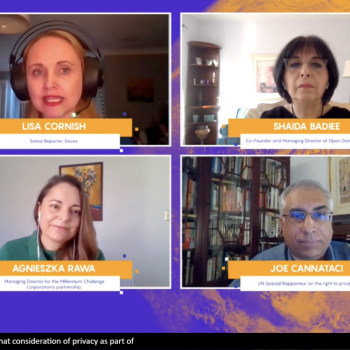
Screenshot from the Data Revolution session at Devex World
Des Chiffres et Des Jeunes (DCDJ) is a program led by Development Gateway and funded by the MCC-PEPFAR Data Collaboratives for Local Impact (DCLI) Program in Côte d’Ivoire. DCDJ aims to bolster the subnational supply and use of data for Ivorian citizens, engage youth as champions of these services, and fuel innovation to address rising data needs. A DCDJ Fellowship provides dual benefits for both Ivorian host organizations and Data Fellows themselves.
As the final cohort of DCDJ Fellows is finishing the work at their placement sites, many are looking for new opportunities to grow professionally. Attending Devex World through DCDJ provided a platform for professional networking, exploring new ideas, and seeing how their data science work fits with the broader development community.
22 Fellows attended all or part of the event, along with French translator Cedric Doffou. Each of the Fellows found value in each of the different sessions, and nearly half of the Fellows said they would use information learned in the Data Revolution session in the future. Specifically, Data Fellows gravitated to the Data Revolution session because of its focus on balancing data skills, data openness, and data sharing. Additionally, Devex Backstage and the Meet & Greet/networking sessions were noted by many Fellows as useful to their careers.
As we near the closing months of the DCDJ program, and work to transfer the project to its future more sustainable parent organization, we will continue to look for opportunities to support the Fellows as their careers grow.

CEO, Josh Powell, Appointed to MCC’s Advisory Council
Development Gateway is pleased to announce that CEO, Josh Powell, has been appointed to the Millennium Challenge Corporation’s (MCC) Advisory Council for the 2020-2022 term. The Advisory Council is a 25 member group of “business leaders, economic development experts, and representatives of advocacy and non-profit organizations,” which provides guidance and feedback to MCC.
Of the appointment, Josh said, “I have long been an admirer of MCC’s rigorous, innovative, and collaborative approach to development. MCC is unique among development agencies in the US and globally, with its combined leadership in transparency, monitoring and evaluation, and innovative financing and operational models. Continuing to ensure MCC’s vanguard position will require ongoing improvements in the way that it generates and uses data and evidence, and supports partners in deploying emerging technology to drive development outcomes. MCC’s governance mandate similarly requires continued evolution as governments globally face unprecedented challenges, with a need for transparent, participatory approaches to solving the problems of the pandemic and post-pandemic era.”
Read MCC’s press release for more information.
Share
Related Posts

Introducing The HackCorruption Civic Tech Tools Repository
Introducing the Civic Tech Tools Repository: an open-source hub of digital solutions to fight corruption. Designed for growth through GitHub contributions, it brings together tools, code, and resources across six key areas for HackCorruption teams and beyond.

From Standardization to Specificity: Localizing Multi-Country Research
Multi-country research must balance consistency with local realities. While standardization allows reliable comparisons and generalizable insights, local context shapes outcomes. This blog explores how programs can strike that balance effectively.
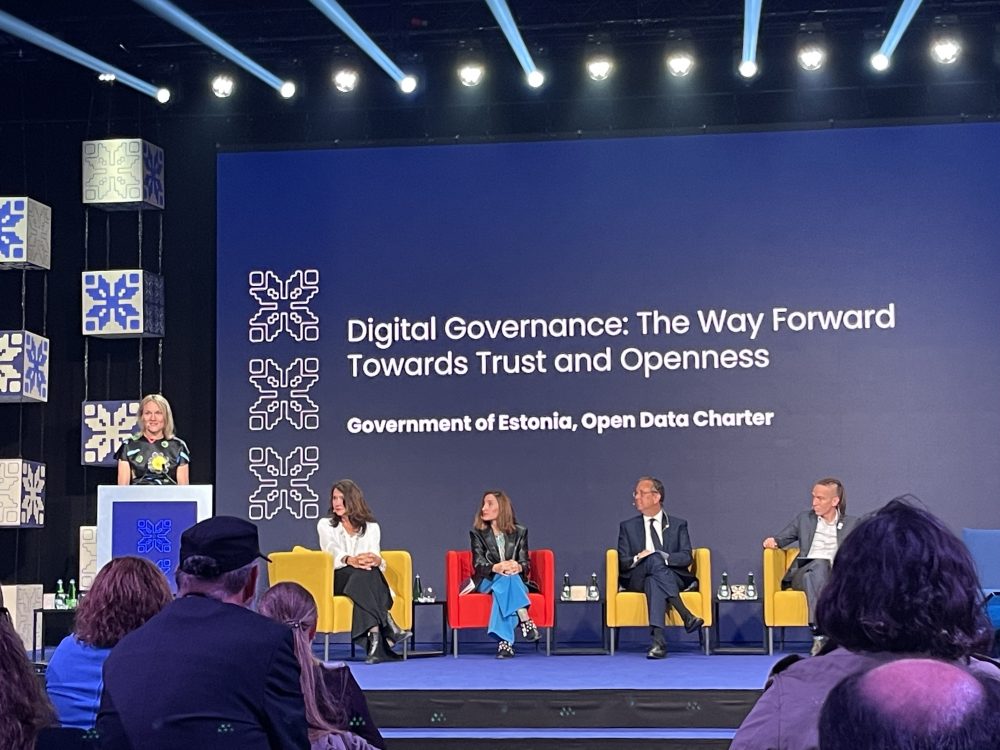
Democratizing Digital or Digitizing Democracy?
The 2023 OGP Summit in Tallinn, Estonia featured a number of discussions centered on open government in the digital age. While the use of digital tools in government is far from a new idea, the COVID-19 pandemic spurred a rapid expansion of this practice, with leaders quickly adapting to remote environments through digitizing government processes
